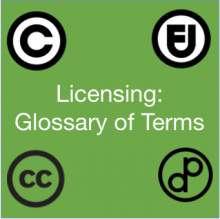Copyright: A way for creators to legally protect "original works of authorship," like books, plays, music, and paintings. U.S. copyright law generally gives the author of an original creative work an exclusive right to reproduce (copy) or distribute the original work to the public, create new works based on their original work, and perform or display their work publicly.
Fair Use: Under certain circumstances, fair use allows a second user to copy part or all of a copyrighted work, even without the copyright holder's permission, and sometimes even if the copyright holder objects to the second user’s work. Courts decide whether or not that second user’s use is fair use case-by-case, primarily based on four factors: (1) the purpose and character of the use of copyrighted work, (2) the nature of the original work, (3) the amount and substantiality of the portion used in relation to the copyrighted work as a whole, and (4) the effect of the use upon the potential market for or value of the original work.
Public Domain: Works in the public domain are not restricted by copyright and creators may use them without getting a license or paying a fee. Works can enter the public domain automatically if they are not copyrightable in the first place or if their copyright has expired. Creators can also specify that they want a work to be in the public domain.
Creative Commons: A Creative Commons (CC) license is an alternative to copyright that lets creators decide how they want other people to share, use, and build upon their original work. For example, a creator can pick a CC license that allows people to remix their original work as long as they get credit, or can decide that they only want to let people use their work if they are not making a profit.
Plagiarism: Plagiarism is the act of passing off someone else’s work or ideas as your own.
Attribution: Attribution is identifying the source of a work (like who created it.) For example, a Creative Commons "BY" or attribution license allows others to use a work as long as they identify its original source.
Open Source: A piece of software is open source if the software’s original source code is freely available and allowed to be redistributed and modified.
Remix: A remix is a new piece of work--like a song, a book, a video, or a painting--that is made by adding, removing, and/or changing pieces of a preexisting work.
Parody : A parody is an exaggerated, often humorous work that takes elements from a preexisting work in order to comment on or criticize that preexisting work. Parody can be a fair use of a preexisting work, as long as a court determines that with the four factor test.
* This glossary is an updated version of the one from EFF copyright curriculum (CC-by-SA). Creative Commons Attribution License

